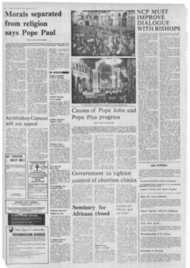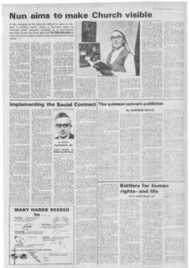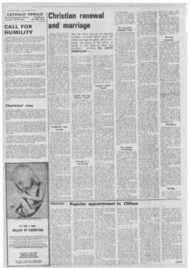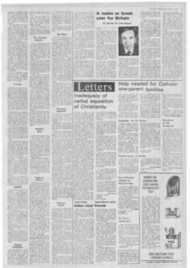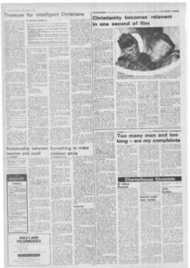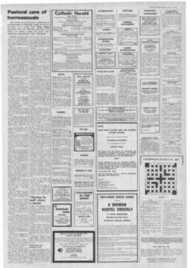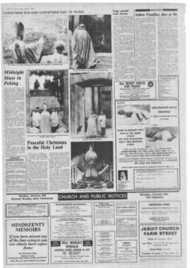Page 6, 3rd January 1975
Page 6
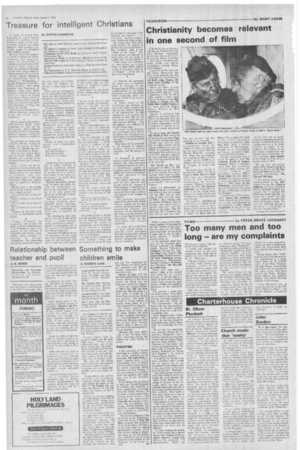
Report an error
Noticed an error on this page?If you've noticed an error in this article please click here to report it.
Tags
Share
Related articles
David D Oherty Of Th E Broadcasting Research Unit...
Ii Whitefriars
'very Good' Viewing, Or Was It?
Ian James On Tv-radio
Paula Davies Writes:
Christianity becomes relevant in one second of film
It should be easy to choose a Top Ten (or Twenty) from the year's television programmes. hut I've just discovered it isn't. Do you just choose at random — from plays, documentaries, series, serials, soap operas, travelogues, comedy shows, news features?
I could fill the list with comedy shows: Morecambe and Wise would probably rate high in anybody's list, but I'd want to add Dad's Army, Steptoe, The Likely Lads, Porridge. All my favourites, in fact.
There are other comedy series I detest, but which rate general public approval. Taste is subjective, a Top Ten list is highly suspect. I never watch sport if I can help it: I love Softly Softly and Kojak, hate The Golden Shot, Candid Camera or any show featuring Hughie Green, Brucie or Bob Monkhouse.
Choice is personal and capricious, and must make no claim to be universal. All I can do is look back over 1974 and say which programmes moved or inspired or amused or infuriated or simply entertained me.
It's safe to begin with Thames's The World at War which ran for six months and never flagged or failed. At least three of its episodes were seen by more then 14 million people and its average audience was over 1 lf million. It is probably the most consistently fine series ever put out by ITV, and may represent the most authentic overall picture of the Second World War so far achieved.
The World at War was challenged on BBC-1 by The Family (not on my list, unless it be for the booby), that saga of everyday Brits from Reading. which had some critics drooling with delight and others foaming at the mouth. I was one of the foamers.
BBC-2's Shoulder to Shoulder was also a challenger, and suffered from the struggle until the BBC had the good sense to show the series again on BBC-I. Sian Phillips, who played Mrs Pankhurst, told me recently that she'd been a chronic non-voter until she played in this series, "But you can't play Mrs Pankhurst and then not use your own vote."
The last election saw her scurrying out to the polls.
Children in Crossfire, BBC's documentary about the children of Ulster. has haunted me ever since I saw it. This was Michael Blakstad's case-book film about the psychological and sociological effect of "the troubles" on the 30,000 or so children who live in areas like the Creggan or Lower Falls Road.
Memorable too, was the tv production (BBC) of Athol Fugard's Sizwe Bansi is Dead which gave us a harrowing lesson on how apartheid dehumanises its victims. Anthony Thomas's powerful trilogy for ITV, The Japanese Experience was blistering commentary on the upside down values of a country which turns Growth into a god and forgets to be human.
Granada's Childhood series was a joy. Some of the play-choices were a little bizarre, but it was an excellent series. My own favourite was H. E. Bates's A Great Day for Bonzo with its delightful child actors. ATV's beautiful dramatised documentary Just One Kid, about a Jewish childhood in Whitechapcl, brought us an unforgettable performance by another child, 11-year-old David Sassini.
For sheer visual enjoyment, it would he hard to beat The Undersea World of Jacques Cousteau (BBC), a four-part series that had everything, adventure, thrills, science, discovery, comedy, and superlative scenery. BBC's World About Us and Anglia's Survival series have run it pretty close, especially the Survival Special The Year of the Wildebeeste, Alan Root's stirring and imaginative film about the gnu and the other animals of the Serengeti.
I musn't forget ATV's masterpiece Antony and Cleopatra, which showed us what really can be done with Shakespeare on television; or BBC's David Copperfield, if only for Arthur Lowe's marvellmus Mr M i ca w he r. So far, there are no overtly religious programmes in this list (though I would hotly deny that a programme has to be about religion in order to be religious). So I hasten to say how much I appreciated and enjoyed Peter Armstrong's recent ambitious Anna Domini series. I hope we'll be seeing a second series in 1975.
But my first and second prizes in this category both go to Shirley du Boulay: for The Four Faces of Christ and for her imaginative documentary, The Fire and The Rose.
I was having lunch with a producer-friend in the BBC canteen the day after Christ in Suffering was shown. My friend had no particular religious convictions, but "I watched that blind man diving frotn the topboard into a pool," she said, "and I suddenly realised that's what Christianity's about. Victory over suffering, and joy in the victory — it was all there in that one second of film."
A happy New Year to you all.
blog comments powered by Disqus



